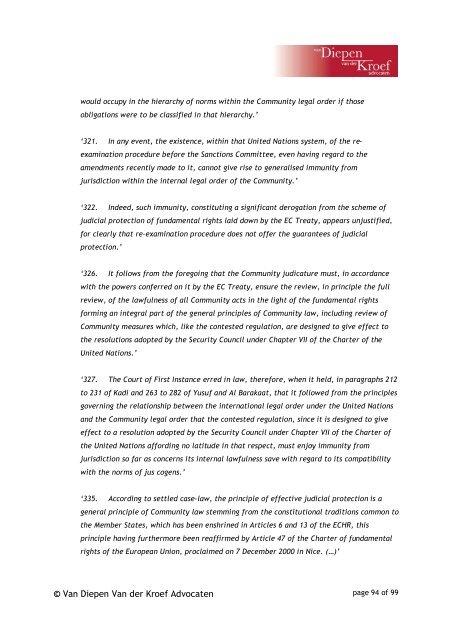© Van Diepen Van der Kroef Advocaten
© Van Diepen Van der Kroef Advocaten
© Van Diepen Van der Kroef Advocaten
- No tags were found...
You also want an ePaper? Increase the reach of your titles
YUMPU automatically turns print PDFs into web optimized ePapers that Google loves.
would occupy in the hierarchy of norms within the Community legal or<strong>der</strong> if thoseobligations were to be classified in that hierarchy.’‘321. In any event, the existence, within that United Nations system, of the reexaminationprocedure before the Sanctions Committee, even having regard to theamendments recently made to it, cannot give rise to generalised immunity fromjurisdiction within the internal legal or<strong>der</strong> of the Community.’‘322. Indeed, such immunity, constituting a significant <strong>der</strong>ogation from the scheme ofjudicial protection of fundamental rights laid down by the EC Treaty, appears unjustified,for clearly that re-examination procedure does not offer the guarantees of judicialprotection.’‘326. It follows from the foregoing that the Community judicature must, in accordancewith the powers conferred on it by the EC Treaty, ensure the review, in principle the fullreview, of the lawfulness of all Community acts in the light of the fundamental rightsforming an integral part of the general principles of Community law, including review ofCommunity measures which, like the contested regulation, are designed to give effect tothe resolutions adopted by the Security Council un<strong>der</strong> Chapter VII of the Charter of theUnited Nations.’‘327. The Court of First Instance erred in law, therefore, when it held, in paragraphs 212to 231 of Kadi and 263 to 282 of Yusuf and Al Barakaat, that it followed from the principlesgoverning the relationship between the international legal or<strong>der</strong> un<strong>der</strong> the United Nationsand the Community legal or<strong>der</strong> that the contested regulation, since it is designed to giveeffect to a resolution adopted by the Security Council un<strong>der</strong> Chapter VII of the Charter ofthe United Nations affording no latitude in that respect, must enjoy immunity fromjurisdiction so far as concerns its internal lawfulness save with regard to its compatibilitywith the norms of jus cogens.’‘335. According to settled case-law, the principle of effective judicial protection is ageneral principle of Community law stemming from the constitutional traditions common tothe Member States, which has been enshrined in Articles 6 and 13 of the ECHR, thisprinciple having furthermore been reaffirmed by Article 47 of the Charter of fundamentalrights of the European Union, proclaimed on 7 December 2000 in Nice. (…)’<strong>©</strong> <strong>Van</strong> <strong>Diepen</strong> <strong>Van</strong> <strong>der</strong> <strong>Kroef</strong> <strong>Advocaten</strong> page 94 of 99
















